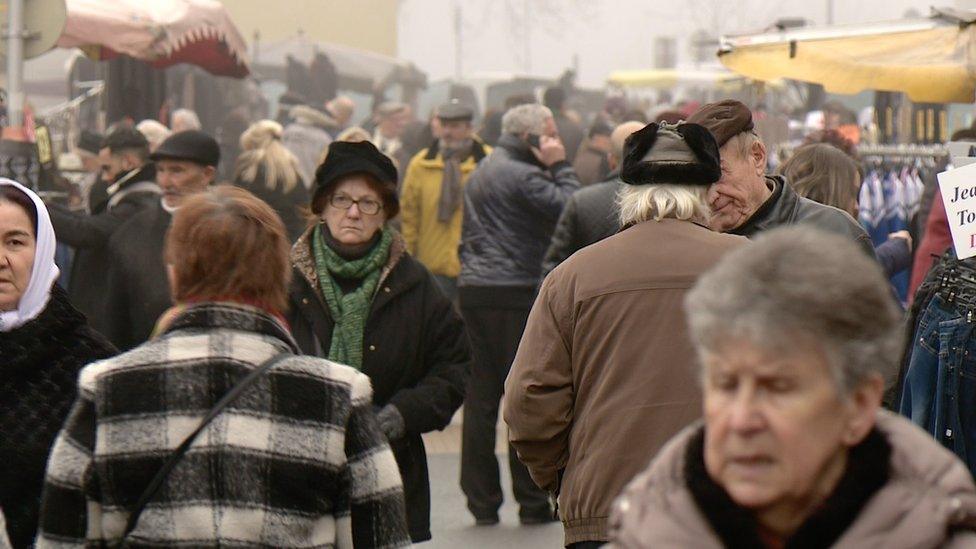Holograms, mistrust and 'fake news' in France's election
- Published
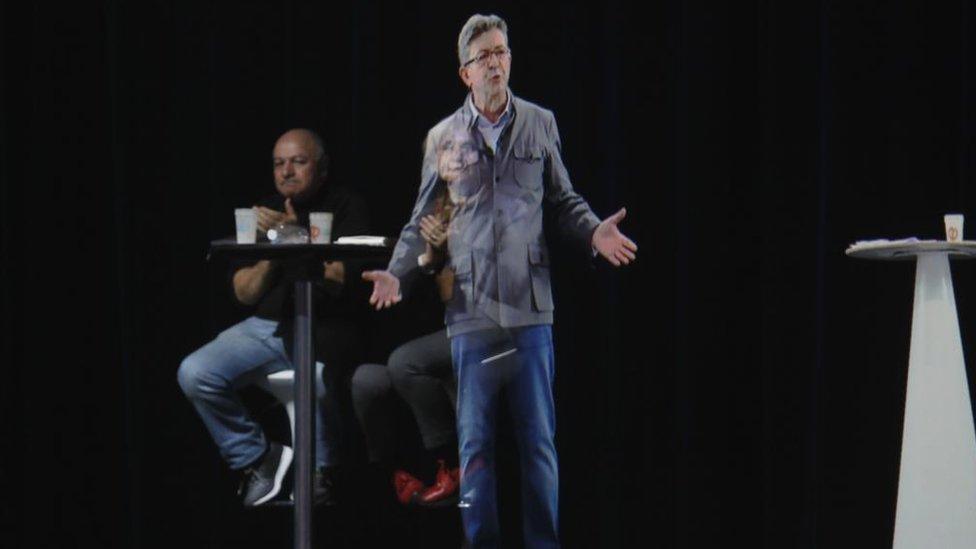
The communications coup of the French presidential election so far goes to far-left candidate Jean-Luc Melenchon who, with a flick of his fingers, appeared at two simultaneous rallies 350 miles apart and created more internet buzz than he could have imagined.
The technology required was nothing new - he does not have the money - but the performance was done with panache. Walking on stage in Lyon, Mr Melenchon materialised at exactly the same moment in hologram form before supporters in Paris. He then made a speech to both audiences for 90 minutes. He likes to talk.
Afterwards Mr Melenchon claimed 60,000 live followers of the event on Facebook and YouTube. Millions more in France and around the world read about the exploit afterwards and clicked online for a taster. In publicity terms it was magisterial.
The Melenchon doppelganger shows how - like so much else in these elections -- the communications pace is being set not by the mainstream parties, but by the outsiders. Of course these days no political outfit is complete without its e-guru advising on digital outreach.
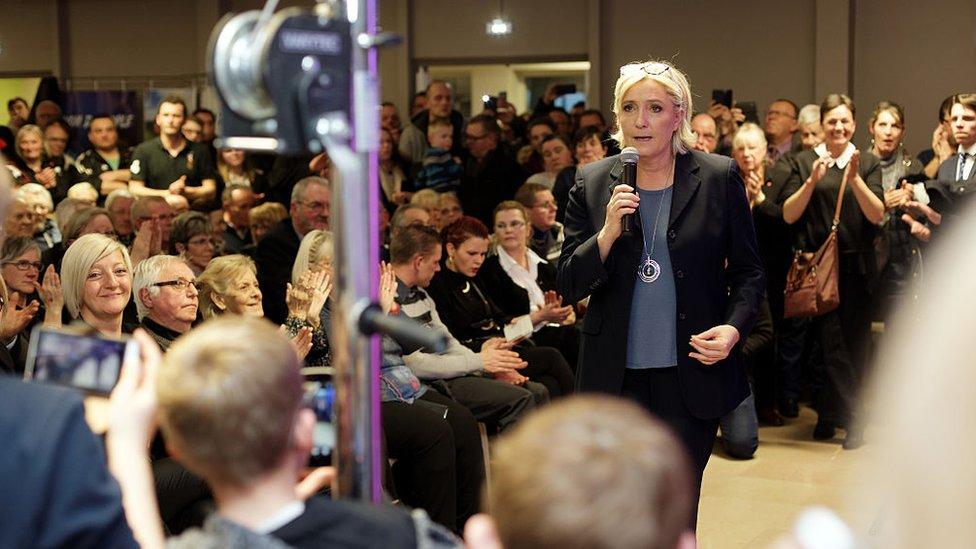
Marine Le Pen leads the field in Twitter followers
But in France 2017, the acknowledged masters of the reseaux sociaux (social networks) are Mr Melenchon for the far-left and Marine Le Pen for the far-right.
Meanwhile, on the independent centre, Emmanuel Macron has charted new ground by creating a whole political movement - his En Marche! (Let's go!) - through clever use of the web.
According to Benoit Thieulin, head of innovation at the digital communications agency Open, "what Melenchon and Le Pen share is a congenital mistrust of the mainstream media. They are both saying 'cut out the distorting filter and connect to us directly'".
Ms Le Pen leads the field on Twitter with 1.28 million followers to Mr Melenchon's 970,000, but he is way ahead on YouTube, with 215,000 to her 12,000. The rest of the field is some way behind.
YouTube videos have become Mr Melenchon's speciality, with a weekly review of the news as well as the occasional special, such as the five-hour spectacular he put on with guests and pie charts to explain his economic programme. He does indeed like to talk.
Ms Le Pen's team push harder in tweets and instant messaging, trying to influence the "meta-debate" with frequent interjections and clever hashtags, like their recent #levraiFillon (the real Fillon) on the corruption allegations, which he has dismissed, concerning the centre-right Republican candidate Francois Fillon.
With more than 60% of 15 to 25-year-olds in France saying they use social media as one of their access points to news, tapping into that flow of information has become a critical part of campaigning.
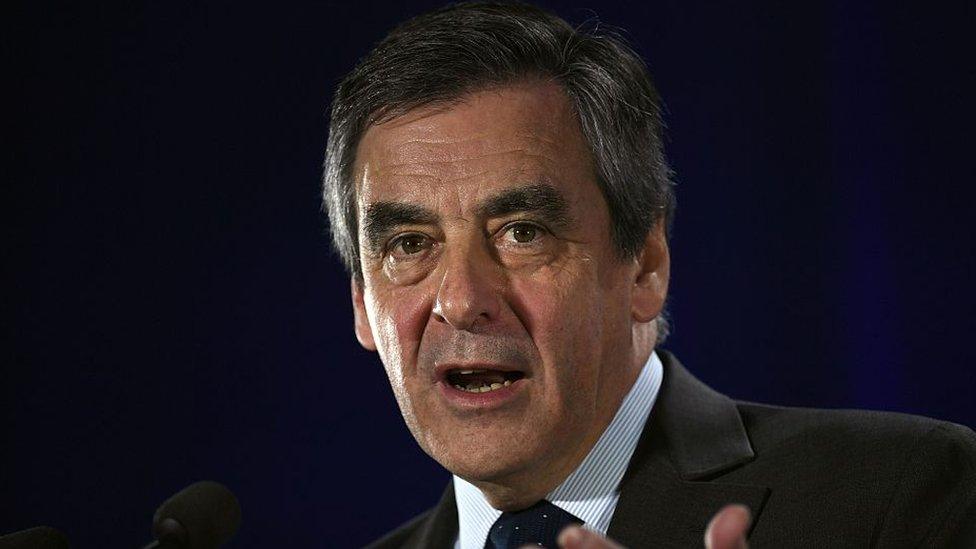
Francois Fillon has been the subject of hashtag campaigns from the National Front
But - as the political world is waking up to discover - the greater the flows of information, the greater the dangers of manipulation, distortion and fraud. In France, as in the US, "fake news" is taken increasingly seriously as a threat to the democratic process.
"As more people go to social networks for their news, they are influenced by factors that are beyond the control of the traditional media. Credibility comes from the recommendations of friends or groups.
"The old architecture of hierarchy, which used to give context to news, is being displaced," says Jean-Marie Charon, media specialist at the Higher School for Social Studies.
Purveyors of "fake news" range from the merely flippant to the ideologically obsessive. In between are websites whose damage comes from mixing - often unintentionally - reliable news with the unreliable, thus contaminating the lot.
In France the website gorafi.fr, external is satirical in intent, but that did not stop an Algerian news organisation picking up its story about Ms Le Pen's plans to build a wall around France with Algerian money.
"There are days when gorafi.fr is one of the most referenced websites on Twitter and Facebook. But we have no idea if visitors take the stories seriously or not," says Mr Charon.
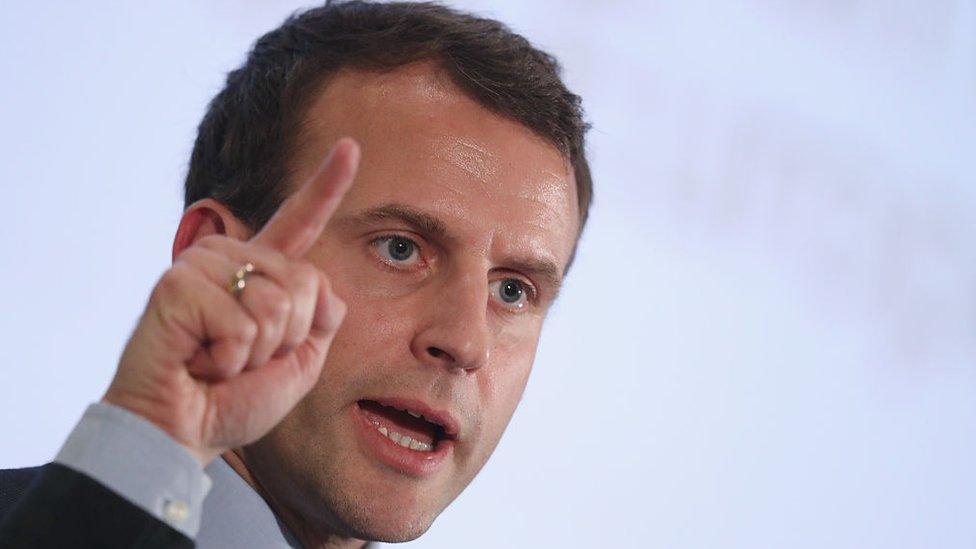
Emmanuel Macron's team recently said it had been the target of cyber-attacks
Though there are fallacious websites that cater for the far-left (such as lesriches.info), it is the far-right that is most adept at internet manipulation, he says. The example set by so-called alt-right groups in the US is no doubt an influence on French websites like info24.fr.
And though hard evidence is lacking, many fear that Russia is joining the fray - either by parlaying "fake news" into the internet machine or, more worryingly, by hacking into party websites. Russia has history in France, having been held responsible for taking the TV station TV5 off air in 2015.
Recently the team behind the centrist candidate, Emmanuel Macron, claimed to be the victim of sustained cyber-attacks, which they feared were from Russian sources.
The theoretical motivation of such attacks would be that Mr Macron's main rivals, Ms Le Pen and Mr Fillon, are markedly more pro-Moscow than he is.
"But the real fear is not that the Russians get into the websites. It's that they hack into the personal mail of political leaders. Then we should be really worried," says Mr Thieulin.
To fight back against the scourge of "fake news", parts of the French media have signed up to internet alarm systems, which let readers check on the reliability of their sources. Le Monde newspaper's system, Decodex, has a desktop icon that changes colour when a website is deemed suspicious.
Everyone agrees that the influence of social media on French politics is growing stronger all the time. But no-one really has any clue how to measure it, or what it all means.
In the absence of guidance, the best bet is to be as eye-catching as possible: perhaps by making your own hologrammatic double.
- Published29 December 2016
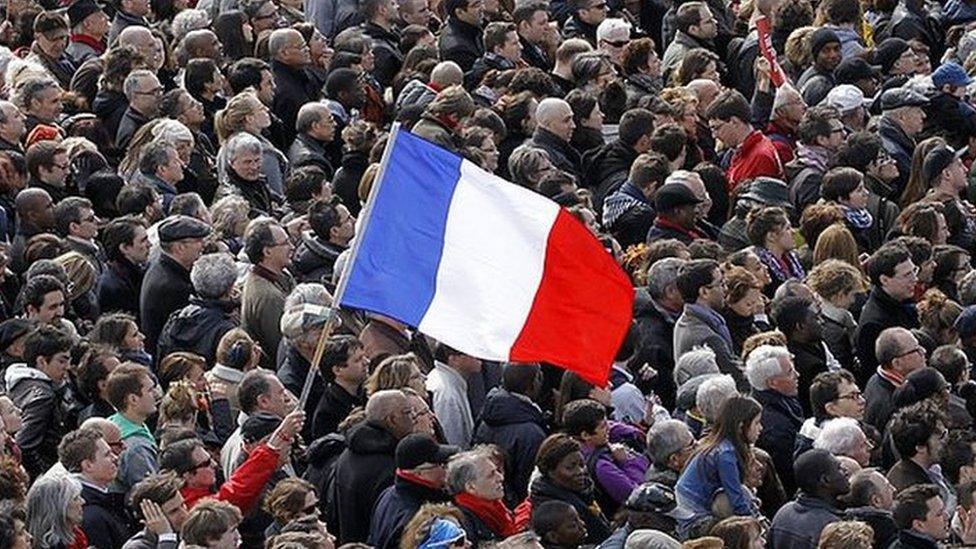
- Published8 February 2017
